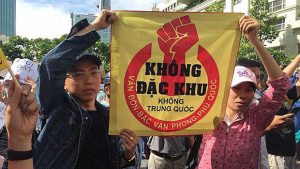More than a dozen protesters were detained in Hanoi on Sunday following demonstrations against proposed special economic zones which could potentially favor Chinese investors. Demonstrations in other Vietnamese cities, including Ho Chi Minh City, also took the streets over the draft law, which would allow foreign investors the ability to lease land for up to 99 years in Van Don in Quang Ninh province, Bac Van Phong in Khanh Hoa province and Phu Quoc in Kien Giang province. Some protesters carried anti-China banners, including one that said “No leasing land to China even for one day.”
The draft law, which was submitted to the 487-member National Assembly last month, has raised concerns that the 99-year lease term could pose threats to national security. In response, Prime Minister Nguyen Xuan Phuc told local media last Thursday the government would make “suitable reductions” to the land lease period after having “received enthusiastic feedback.” On Saturday, the National Assembly was requested to delay its vote on the draft law to provide for further debate on the legislation. And on Sunday, that “enthusiastic feedback” boiled over into street protests.
While current Vietnamese law allows for land lease terms of up to 70 years, the proposed lengthening of lease terms coincides with rising tensions over sovereignty in the disputed South China Sea, and rapid militarization of Chinese-held islands in the Paracel island archipelago, which Vietnam also claims and where Vietnamese forces were driven off by the Chinese in 1974.
China’s recent actions to assert its sovereignty have not only heightened tensions between the two capitals, but also increased anxiety and hostility among some Vietnamese. More recently, this bitterness flared in May 2014 with the deployment of a Chinese oil rig into Vietnam’s economic exclusive zone. Several Chinese were killed during nationwide rioting and thousands of Chinese chose to flee the country.
Vietnamese attitudes toward China were forged in the wake of centuries of living under the suzerainty of Chinese dynasties, and fears over Chinese investors controlling or owning Vietnamese land have grown in recent years along with China’s economic might and global reach. Last month local media reported on spreading real estate speculation by buyers in the south-central province of Phu Yen in Vietnam. According to the reports, the buyers (from Hanoi and other northern provinces) were willing to pay three to five times the market price for seaside land in the coastal town of Hoa Hiep Trung.
Tran Dinh Quy, a member of the Vietnam National Real Estate Association, believes a group of “professional brokers” are “manipulating land prices by sending ‘false’ buyers to the market, duping residents into thinking that their land is valuable and prices will continue to soar.” Others fear Chinese buyers are using local Vietnamese to purchase prime waterfront properties along Vietnam’s coast.
Vo Thi Mi, a resident of Hoa Hiep Trung, said one buyer offered to buy her land for almost three times the government rate, but was “concerned if this is nothing but a fraud” and heard that “Chinese people are behind this land-buying spree.”
While the local authorities investigating the land purchases may eventually discover the high prices in Phu Yen are being driven by Chinese or Vietnamese price speculators, given existing paranoia surrounding Chinese investors, other motives will need to be ruled out. In 2014, three projects in the central coastal city of Da Nang, suspected to be backed by Chinese, were rejected by Vietnam’s Command of Military Zone 5. The projects, in agriculture and tourism, were cancelled as their operations were to take place in areas deemed sensitive in terms of national defense.
In 2015, 13 coastal land plots were sold to local Vietnamese-run businesses (with mostly Chinese suspected of providing the cash) in the central Vietnamese city of Da Nang. While some of the plots will be used to build seaside hotels and restaurants catering to Chinese tourists, Tran Tho, secretary of the Da Nang’s Party Committee, called the land purchases “very dangerous” while a local attorney, Le Cao, warned “we have to remain cautious as foreign ownership of coastal land plots can affect the national defense and security.”
These latest protests on Sunday show just how deep anti-Chinese sentiment runs among some Vietnamese, and while the land purchases in Phu Yen have more to do with economic and monetary considerations rather than covert military planning, Vietnamese officials will need to ensure any rumors over coastal land purchases or long-term leases controlled by Chinese investors are quickly investigated and dealt with before anti-Chinese sentiment flares again.
Gary Sands is a Senior Analyst at Wikistrat, a crowdsourced consultancy, and a Director at Highway West Capital Advisors, a venture capital, project finance and political risk advisory. A former diplomat with the U.S. Overseas Private Investment Corporation, he has contributed a number of op-eds for Forbes, U.S. News and World Report, Newsweek, Washington Times, The Diplomat, Asia Times, National Interest, EurasiaNet, and the South China Morning Post. He spent four years in Vietnam from 2013 to 2017.

































